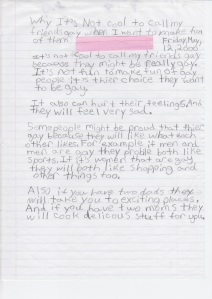Discourse Theory
I am reading about discourse theory. In particular, Laclau and Mouffe’s (1985) theory, but I am not reading the original (yet). I never seem to be reading original work… Anyways, this is a theory that understands all social phenomena as discursive constructions. (It’s the next chapter in the Phillips & Jørgensen book.) Within this theory, subjects are understood as subject positions within a discursive structure. They are always fragmented, because they have multiple identities, and this is what decenters them. All this thinking about discourse and identity has me noticing discourse and identities everywhere! While reading this chapter, I was reminded of a text I once forced a child to write.
You see, in another life I was an elementary school teacher, teaching a combined grade 4/5 class. We had just completed a unit on human rights, where we had explored issues of racism, homophobia, children’s rights, sexism, etc. And lo and behold, a little boy calls his friend gay, as an insult. He was a nice kid, and his writing skills were good enough that I ordered him to write an essay about why the word gay is not an insult. (Notice how I just discursively constructed the boy as nice, and a good student. I didn’t tell you he had many friends, or that his parents had immigrated to Canada shortly before he was born, or that he was an only child…)
Looking back I would never force a kid to write what I think he should believe, but people change, I’ll give my 20-something self a break. I kept the essay because I found it hilarious, but all this reading and discussing of discourses made me think of it again, and I dug it up for analysis. Take a look:
With my limited understanding of discourse theory, I notice three important signifiers here: gay, fathers and mothers. First of all, my young author constructs being gay as a choice, and there is a subtext of having the right to make this choice. Notice how making fun of friends by calling them gay is described as “not cool,” “not fun,” and “it can hurt their feelings.” I wonder if there was some resistance going on here, if he did indeed find making fun of his friends “cool” and “fun.” He also mentions being proud. I wonder if the gay pride discourse (this was in a city with a very gay presence) had made its way into the text.
Within the classroom context, I, as his teacher (and my human rights unit) had recently challenged what until then he understood as a normal or natural family. So this boy used the discourses he already associated with fathers and mothers to conceive of an alternate family structure: one where two moms, or two dads, are just like one, only doubled. Men, and dads, like sports and take you to exciting places. Women, and moms, cook delicious stuff, and like shopping, and “other things too.” I particularly appreciate the “other things too,” as there seems to be a discourse about men not being able to understand women going on there.
Laclau and Mouffe’s discourse theory is also really helpful in helping me understand a dilemma I have had in practice, reconciling the ideas of post-developmental (Edwards, 2009) views of childhood and early childhood education with early intervention for children with special needs. The post-developmental discourse views all children as rich or at-promise (as opposed to some kids as at-risk) (Dahlberg, Moss & Pence, 2007; Swadener & Lubeck, 1995), rejects the deficit-oriented way of comparing children to a predetermined list of milestones they should achieve by specific age, and suggests that we miss who the child is when we divide them into developmental spheres (cognitive, socio-emotional, motor, etc.). I agree with all of that, as a teacher and a parent. But, part of my job as an early childhood consultant is to support the inclusion of children with special needs or difficult behaviour into childcare centres. In a collaborative process with parents and educators, we discuss the child’s strengths, interests and needs in order to adapt the situation, and put interventions into place that will help the child develop in areas where he or she is different from the other kids. These two ways of viewing children can be seen as competing discourses, that Laclau and Mouffe would call antagonisms. While one can say that the hegemony of the developmental view of children, the developmental psychology discourse that has dominated early education since the 1960s, is slowly being replaced in many parts of the world by post-developmentalism (and a number of Canadian provinces, but not Quebec), I want to know if there is a way for them to co-exist – post-developmental theories don’t seem to acknowledge that some kids need extra support, but the educators and the parents see this as a very pressing need. I think I just found the topic for my post-doc. I wonder if this question has already been explored? I’m off to do some research! And to read the next chapter on critical discourse analysis.
References (who blogs in APA style? What is wrong with me?)
Dahlberg, G., Moss, P. & Pence, A. (2007). Beyond Quality in Early Childhood Education and Care: Languages of Evaluation, (Second Edition). London and New York: Routledge.
Edwards, S. (2009). Beyond Developmentalism. In S. Edwards & J. Nuttal (Eds.). Professional Learning in Early Childhood Settings (pp.81-96), Rotterdam: Sense Publishers.
Phillips, L. & Jørgensen, M.W. & (2002). Discoure Analysis as Theory and Method. London: Sage.
Swadener, B.B. & Lubeck, S. (Eds.) (1995). Children and Families “At Promise” : Deconstructing the Discourse of Risk. Albany, NY: State University of New York Press.
